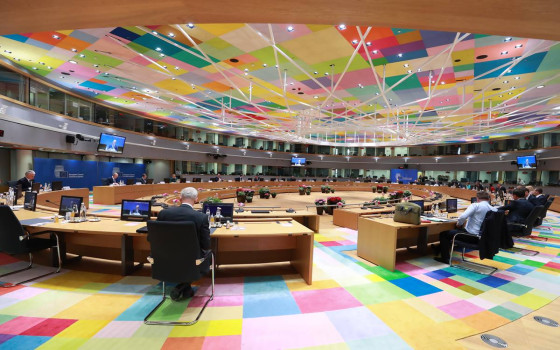
The European Union approved the tenth package of sanctions against Moscow, confirming its strong impact on the Russian economy

- Europe and Arabs
- Tuesday , 21 February 2023 15:16 PM GMT
Brussels: Europe and the Arabs
The European Union decided to extend the sanctions against Russia until the end of February 2024, which are the sanctions that come within the framework of the restrictive measures in response to the Russian Federation’s recognition, occupation or illegal annexation of some non-governmental regions in Ukraine, according to what was published in the Official Gazette of the Union today, Tuesday.
This decision is valid until February 24, 2024. This decision shall enter into force on the day following its publication in the Official Journal of the European Union.
The decision came a few hours after a meeting of EU foreign ministers, where the ministers discussed military support to Ukraine through the European Peace Facility and training activities within the framework of the EU Military Assistance Mission in Support of Ukraine (EUMAM Ukraine).
The Council also discussed urgent and important Ukrainian needs for ammunition. In this regard, the discussion focused on how to intensify the joint efforts of the European Union, in particular through possible purchases at the EU level to meet the urgent needs of Ukraine. The EU defense ministers are likely to touch on the subject at their next informal meeting in Sweden.
The ministers also exchanged views on the adoption of the tenth package of sanctions against those who play an active role in the continuation of the Russian war of aggression, the issue of full accountability for Russian crimes including the crime of aggression, and diplomatic communication with the G7 partners. and at the United Nations with the aim of ensuring broad support for the resolution on the principles of the United Nations Charter underlying a comprehensive, just and lasting peace, to be voted upon in the United Nations General Assembly.
Since the end of February last year, the European Union has approved 9 packages of sanctions against Russia, including financial and trade restrictions, in addition to individual sanctions.
Since February last year, the European Union has announced a series of sanctions against 1,386 individuals and 171 Russian institutions and organizations.
"There was strong support across the room for the tenth package of sanctions," Josep Borrell, European foreign policy chief, told a news conference. And let me [mention] that the sanctions are working, that we are having a huge impact on the Russian economy. Look at the general deficit. Look at the trade deficit. Look at the income from the sale of fuel. These three variants are in very poor condition.












No Comments Found